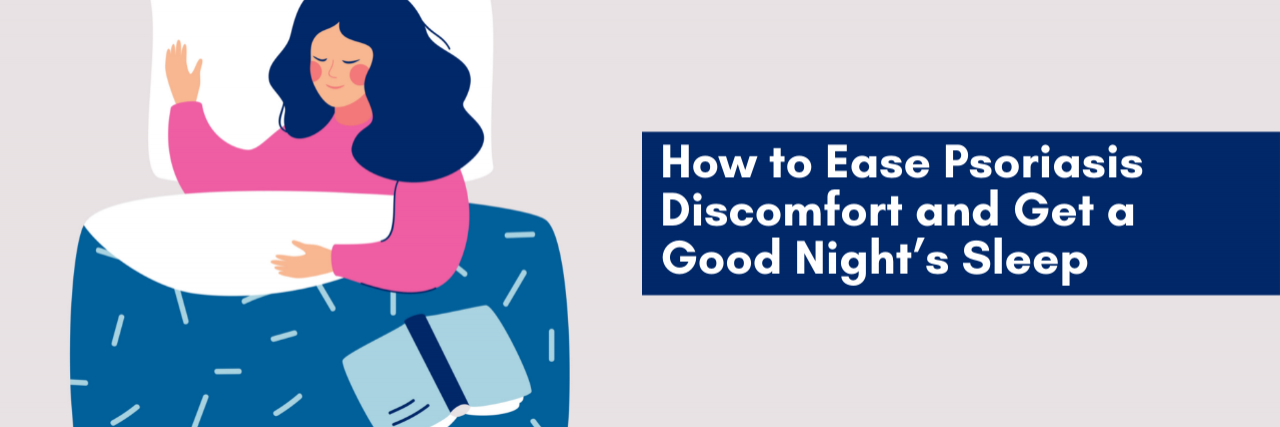Getting a good night’s sleep with psoriasis can be a challenge when you’re managing a flare. The irritation and discomfort of your psoriasis spots can make it harder to fall asleep and find a comfortable sleeping position. The discomfort of psoriasis symptoms can play a big role in your lack of restful sleep, but there could also be other contributors.
The topical treatments that you’re using can make it uncomfortable to get to sleep. When I was first diagnosed with psoriasis at the age of 15, topical treatments were the only thing I was using to manage my disease. My doctor advised that if I put on the creamat night before bed, I should wrap my body in saran wrap so the medication would stay on my skin versus my clothes. I was using an incredibly greasy and messy medication, and I distinctly remember the crinkly sound of the wrap anytime I’d move.
People diagnosed with psoriasis are also at risk for comorbidities that can affect your sleep, including sleep apnea, restless leg syndrome, and psoriatic arthritis. If you believe that could be the issue, talk to your doctor about options for diagnosis and treatment.
Not sleeping well can be contributing to additional stress and stress is a common trigger for psoriasis flares. Therefore, it’s important to get the sleep you need to avoid bringing on a new flare or irritating a current flare. Here are some ways to stay comfortable at night so you can sleep more soundly.
Heavy Moisturizing
I absolutely love a nice hot, scalding shower but my psoriasis does not. The spots get even more dried out and uncomfortable. Before heading to sleep, I usually take a quick, room temperature shower. I towel off in the shower and then apply a light layer of gel oil. While I brush my teeth and wash my face, I let the oil seep into my skin. Then I apply a layer of cocoa butter lotion to my body, wait a few minutes, then put on my pajamas.
Use whatever lotions, oils, creams, etc. that work for you. I also rely heavily on coconut oil, topical medications when I’m flaring, and shea butter lotion. I try to avoid any scented products because those make my skin irritated.
Wear and Sleep on Cotton
The fabrics that you put on your body and surround your body should be soft and breathable. I lean toward cotton because it’s easy to find, wash, and is relatively inexpensive. I’ve learned over time that my pajamas will get dirty quickly from the layers of lotion, and there will likely be stains — just something to keep in mind when selecting your jammies!
I also use cotton gloves. I’ve woken up countless times bleeding because I was scratching my spots at night. Now I put a thick coat of moisturizer on my hands and cuticles and then put on cotton gloves to lock in the moisture and prevent scratching when my skin is flaring.
Borrow from the Medicine Cabinet
For help reducing itch, try taking an antihistamine before heading to bed. Before you do that though, check with your doctor to see if you can take it with your psoriasis medications.
Vick’s Vapor Rub is another common medicine cabinet trick for itch relief. The menthol can soothe itchiness, and the petroleum jelly keeps moisture locked in.
Use a Humidifier
A humidifier is another great way to keep skin moisturized throughout the night. Especially in winter when the dry heat is blasting; the humidifier keeps the air moist and comfortable for sleeping. And it’s best to keep the temperature of your room cool, not cold, or hot.
Meditation
When my body is uncomfortable, I find it hard to think of anything else which often makes it even harder to fall asleep and stay asleep. I use a meditation app that guides me through the process of shutting down my body and relaxing my mind. It gives me something specific to focus on so I can shift from thinking about psoriasis.
The Takeaway
Getting comfortable for bed, especially getting moisturized, is crucial for a good night’s sleep with psoriasis. With these tips, your mind and body will be ready to drift into dreamland!

